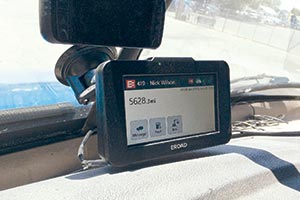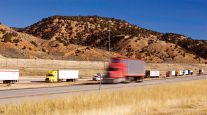VMT Programs Advance in California, Oregon

This story appears in the July 11 print edition of Transport Topics.
California launched a nine-month vehicle mile tax pilot on July 1, just as its northern neighbor, Oregon, reached the first anniversary of its own program.
The two states have the nation’s only active VMT programs, according to the Federal Highway Administration.
Both programs monitor miles driven in-state with projected charges, allowing drivers to compare those with actual fuel taxes paid. California’s VMT program includes large trucks, as Oregon’s does because of its long-established weight-mile tax for those vehicles.
Oregon originally sought 5,000 volunteers but had 879 active drivers paying 1.5 cents per mile and getting tax credits to balance their state fuel taxes — and 1,025 active vehicles — in the program as of June 30, said Michelle Godfrey of the state’s Department of Transportation. Revenue from the program, MyOReGo, goes to the state treasury.
California had enrolled 3,104 of its maximum of 5,000 drivers, including 54 trucks — four more than the minimum requested — in Road Charge as of July 6, said Carrie Pourvahidi of the state’s Department of Transportation.
“With the FAST Act signed, there’s a sense of urgency for us to get our Road Charge pilot going and completed, so we can start maybe moving toward a federal program,” Pourvahidi told Transport Topics.
“We have a priced-base excise tax [on gasoline] in California that’s adjusted every year. It’s going down in July, so we’ll be collecting even less revenue,” Pourvahidi said. “We don’t see it going back up, so we need to find another revenue source that’s stable and sustainable.”
The California State Board of Equalization voted Feb. 23 to lower the excise tax rate for gasoline. The excise tax rate of 30 cents per gallon for gasoline expired June 30. A new excise tax rate of 27.8 cents started July 1 and will expire next June 30.
Devine Intermodal, a West Sacramento truckload firm, supports the VMT program, signing up 17 of its 150 trucks.
“Every driver should be paying equally to maintain the roads,” said Adam Gallagher, safety director for Devine Intermodal.
The company, which started the pilot with two trucks, uses a dashboard-mounted device supplied by ERoad.
Auckland, New Zealand-based ERoad is a transport technology and services company that provides automated solutions to manage and pay road user charges in California and Oregon. Its U.S. base is in Portland, Oregon.
“As we get these more fuel-efficient vehicles, they use the roads the same amount, but they’re not generating the same tax revenue to fix the roads. The ERoad device also gives us a lot of other information, including electronic logging. We think it’s going to be beneficial for our company.”
ERoad designs and manufactures in-vehicle hardware and operates secure payments.
Godfrey said Oregon’s program, MyOReGo, is “working terrific,” citing an 83% retention rate by drivers who enrolled. MyOReGo will continue until or unless the Legislature, which reconvenes in February, ends it.
“Since we’ve had a weight-mile tax in Oregon for decades, we get a little bit of a chuckle watching automobile drivers contemplate this VMT program,” Oregon Trucking Associations President Jana Jarvis said. “It hasn’t been accepted very well. They were looking for 5,000 volunteers.”
In contrast, Eric Sauer, vice president of the California Trucking Association, was one of 15 members of the technical advisory committee for Road Charge.
“The Road Charge concept isn’t embraced by the industry, but our membership supported us being in the pilot,” Sauer said. “We had a pretty large footprint in designing the program from the trucking industry’s perspective.
“This allows carriers to get familiar with the program and work through any issues if this proves to be viable,” he said, “but if it doesn’t work for our members, we won’t support being part of this. In that case, then we march on to another opportunity to try to solve the transportation funding crisis in California. We support higher fuel taxes as long as they go for their intended purpose.”


